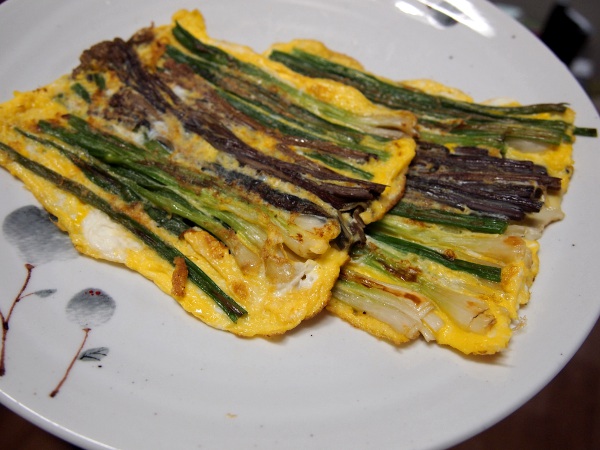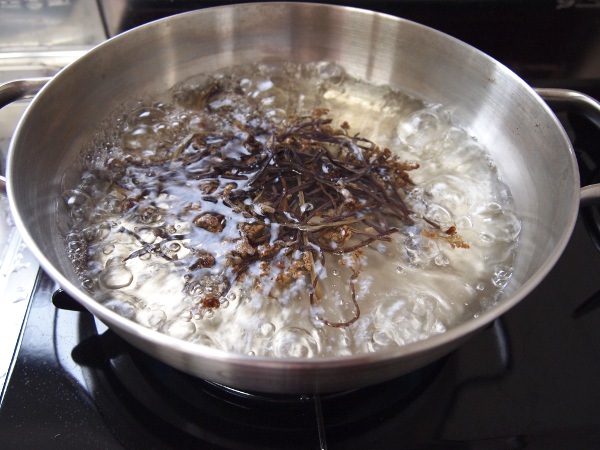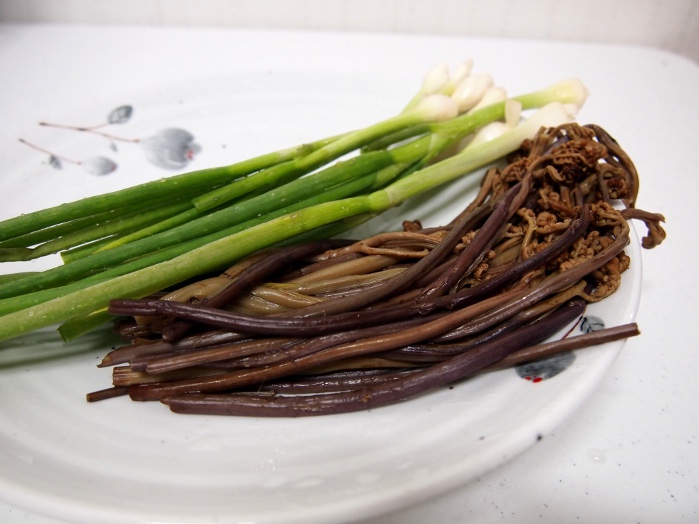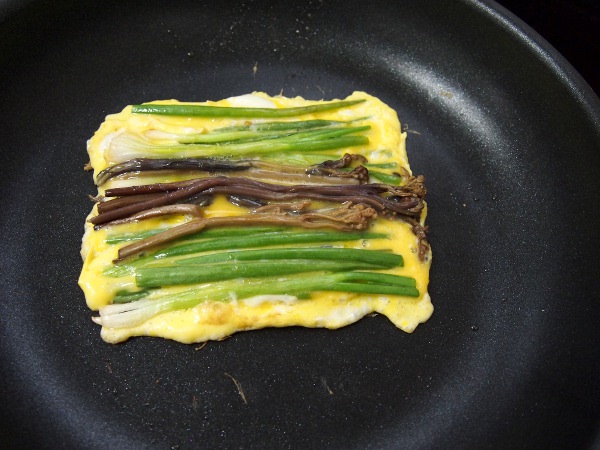
- Updated 2024.4.16 17:33
- All Articles
-
member
icon
-
facebook
cursor
-
twitter
cursor
| |
 |
|
| ▲ Photo by Kim Jung Lim |
Jeon is a traditional Korean dish composed of sliced vegetables, fish or meat, which are usually coated in a grain batter and pan fried with just a dash of oil. It plays an essential role in Jeju culture, especially as a dish served during memorial ceremonies honoring the spirit of one’s ancestors.
So, it may come as no surprise that there is a great variety of jeon found all throughout the country. There are kimchi jeon, mashed potato jeon, tofu jeon, red or green pepper jeon, flower petal jeon, and many, many more.
Naturally, Jeju is no exception.
According to Jeju traditional food expert Yang Yong Jin, it appears that the citizens of Jeju have traditionally used quite different ingredients in the making of jeon than in other parts of the country, due mainly to the island environment and its unique culture. Among these special ingredients are bukbugi jeon (made with pork lung), buckwheat jeon, chogi (shiitake) jeon, and neureumi jeon, which is the subject of today’s recipe.
Neureumi jeon is made with slices of Jeju local gosari (bracken) and pa (green onion) which are laid out into a square shape. Yang said it is difficult to find this dish in other parts of the country and so when even Koreans try it they are surprised by the harmonious combination of the two ingredients which, at first glance, seem mismatched.
The reason this dish is used as an offering during jaesa (a funeral ritual) is that its shape is reminiscent of a square of cloth, something Koreans use as a carrier or container. Since the soul of one’s ancestor has no cloth, it is thought the neureumi jeon can serve as a container for the departed to carry the jaesa offerings into the other world.
In spring it’s easy to find fresh sprouts of gosari in any of Jeju’s fields.. The local variety is darker and thicker than most, and is famous nationwide for its high quality and taste.
Even though several scientific studies have shown gosari to be somewhat toxic and containing anti-vitamins, the Korean technique of boiling and soaking the plant serves to detoxify the gosari enough for consumption. Gosari contains lots of protein, vitamin B2, and fiber, and dried gosari has additional vitamin D. Also, consuming its powdered roots has been known to reduce fevers and prevent insomnia.
Ingredients
5 grams of dried gosari (or 50 grams of boiled gosari)
50 grams of green onion
2 eggs
5 ml of cooking oil
1 ½ tsp of salt
Serves one to two people.
1. Gorasi preparation: Put the fresh gosari into boiling water for five minutes and soak it in cold water for six to eight hours. If you start with dried gosari, after boiling it, drain and refill with fresh water. Boil again. Then soak in cold water for the above mentioned six to eight hours.
2. Season the boiled gosari with salt and cut the green onion into 10-centimeter long pieces.
3. Pour beaten egg into the oiled and heated pan.
4. Place a bundle of gosari, three centimeter in width, in the center of the pan. Then on either side of gosari, put three centimeters in width of green onion. Place carefully for the desired shape is a perfect rectangle.
5. Dribble beaten egg onto the vegetables.
6. After two minutes, flip the neureumi jeon and cook on low for two more minutes.
| |
 |
|
| ▲ Photo by Kim Jung Lim |
| |
 |
|
| ▲ Photo by Kim Jung Lim |
| |
 |
|
| ▲ Photo by Kim Jung Lim |
(Gosari preparation was provided by Lee Yeon Sook, a Jeju islander.)
References:
“Jeju Traditional Food” published by Jeju Special Self-Governing Province Agricultural Research And Extension Services
“200 Health Foods” written by Kim Jeong Sook |
|
|
|
|
|
|
|
|
|
|
ⓒ Jeju Weekly 2009 (http://www.jejuweekly.net)
All materials on this site are protected under the Korean Copyright Law and may not be reproduced, distributed, transmitted, displayed, published without the prior consent of Jeju Weekly. |
|
|
|
|
| Jeju-Asia's No.1 for Cruise |
|
|
|
Title:The jeju Weekly(제주위클리) | Mail to editor@jejuweekly.net | Phone: +82-64-724-7776 Fax: +82-64-724-7796
#503, 36-1, Seogwang-ro, Jeju-si, Jeju-do, Korea, 63148
Registration Number: Jeju, Ah01158(제주,아01158) | Date of Registration: November 10,2022 | Publisher&Editor : Hee Tak Ko | Youth policy: Hee Tak Ko
Copyright ⓒ 2009 All materials on this site are protected under the Korean Copyright Law and may not be reproduced, distributed, transmitted, displayed, published
without the prior consent of jeju weekly.com.

|























